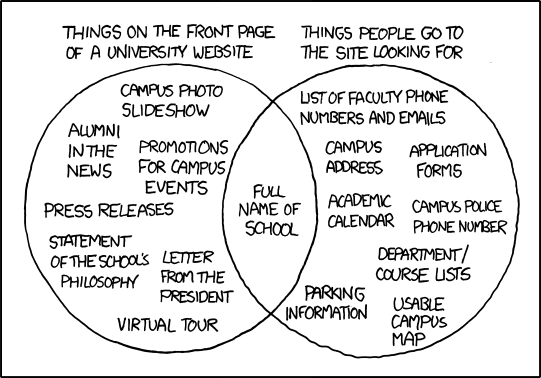
This comic made me laugh today:

I design websites on the side sometimes, and I can promise you that university websites are not the only ones that fall in to this trap. This cartoon could easily be remade for corporations, organizations, churches, small businesses… you name it.
You see, the stuff on the left is the cool, flashy stuff that people say they want when researchers go out and poll them to find out what they “want” in a website. The problem is that people are horrible at describing what they really want. What they really go to look for on websites is on the right – they just don’t know it half the time.
To be a web designer, you have to be able to look at the poll results and analyze what people are really wanting. I read a study a while back on what church members want in a website. The article proclaimed that Church members don’t want “social networking” according to the survey. They all directly stated so in the survey, after all. What did they want in a church website? A place to share photos, to form groups and send messages to those groups, a place to keep track of events and updates on other members, etc. In other words, they wanted all the functionality of social networking. The problem was that they probably just saw the word “social networking”and thought “FaceBook” and then reacted: “I don’t need another Facebook!”
This is not really a flaw in people per se – it was a flaw in the researchers. They didn’t know how to properly design a survey or how to interpret results. Unfortunately, this group of researchers is trying to position themselves as the leading authority in church web research. Oh, well.
It really comes down the difference between MySpace and Facebook. MySpace initially hit on something that people liked, but at some point they decided to only following what the (bad) research told them. Many people don’t remember that they actually started declining before the rise of Facebook. FaceBook has always done what they think people really want, no matter what bad research says or how loud the vocal minority complains. I mean, have you ever heard anyone complain about any changes to MySpace? Of course not – MySpace follows the bad research and doesn’t rock the boat. People complain about every change FaceBook makes, but then the anger quickly dies down because most people realize they like the new stuff better and never would have realized that until they tried it. FaceBook knows that you have to rock the boat sometimes and give people what they really want in spite of themselves.
Except in privacy issues. They really seem to miss to boat on that big time.
I keep saying bad research because there is a difference between bad and good research. To use another comparison – look at the difference between Microsoft and Google. Both rely heavily on research, but Microsoft is usually scratching their heads as to why their great ideas didn’t work out as great as the research indicated it would. They rely too much on what people say they want rather than what people really want. Google has found ways to actually determine what people really want. A researcher from Google came to where I work once and spoke on how they do research – fascinating stuff. They have actually developed machines that can track where your eyes look on a web page. No matter how awesome they think some new feature is, they will always set large numbers of people in these machines to see if the new feature really works on real people. If not, back to the drawing board. This Google researcher showed us some videos that were hilarious – people actually claiming they just could not find and use a feature they were currently using at that moment.
People just don’t really know what they want sometimes.

